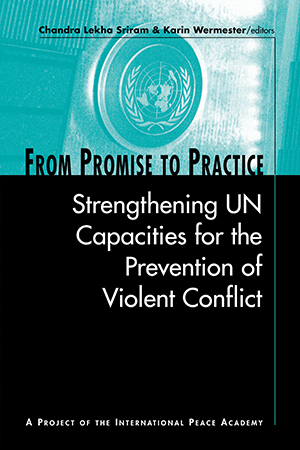
- 2003/434 pages
- A project of the International Peace Institute
From Promise to Practice:
Strengthening UN Capacities for the Prevention of Violent Conflict
Hardcover: $62.00
ISBN: 978-1-58826-135-9
Paperback: $25.00
ISBN: 978-1-58826-112-0
How can the United Nations, regional and subregional organizations, government donors, and other policymakers best apply the tools of conflict prevention to the wide range of intrastate conflict situations actually found in the field? The detailed case studies and analytical chapters in From Promise to Practice offer operational lessons for fashioning strategy and tactics to meet the challenges of specific conflicts, both potential and actual.







